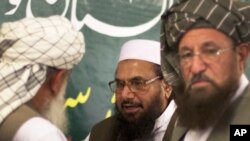Hafiz Mohammad Saeed founded the militant group Laskhar-e-Taiba. The United States has dubbed the group a terrorist organization. And earlier this week, Washington posted a $10 million bounty for information leading to Saeed's arrest and conviction. The Pakistani cleric, who operates openly in his country, responded by mocking the United States at a news conference, while Pakistani officials warned the U.S. to tread lightly.
The 2008 terrorist bombing of an Indian hotel in Mumbai's financial district killed 166 people, including six Americans. The Pakistani-based militant group Lashkar-e-Taiba was allegedly behind the attack.
Speaking publicly in Pakistan, Saeed says the money should go to him.
"To be honest, I am surprised that America doesn’t know where I am," he said. "Today I met the leadership of the Difa-e-Pakistan [Defense of Pakistan] Council here in Rawalpindi, and tomorrow I will be in Lahore and will release a schedule for the day after tomorrow, so America can contact me."
With U.S.-Pakistani relations already strained, Pakistani officials aren’t pleased.
"I will say that it will impact negatively because this is an added pressure on Pakistan from the U.S. side and it seems to be having done it at the Indian behest," said Pakistani Lawmaker Mushahid Hussain.
At issue now: whether Pakistan will re-open its ground route for NATO supplies into Afghanistan. Saeed has lobbied hard against this.
Meantime, Pakistanis and others wonder: Why has the U.S. made this move now?
Rand Corporation analyst Jonah Blank says the timing may have little significance.
"The decision may have been 'We are ready to present and there isn’t a pressing reason to hold off on presenting right now," he said.
Other analysts have suggested that the U.S. is especially concerned about Saeed's group, which they say is definitively linked to many terrorist acts. But what happens next is anyone’s guess.
"The question is whether the Pakistani state is going to make the political decision rather than the legal decision that it will provide full cooperation. And I think the more evidence we can present the more likely we are to get that result," said Blank.
The reward for information on the cleric is the second highest bounty ever offered by the U.S.




